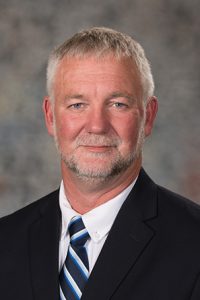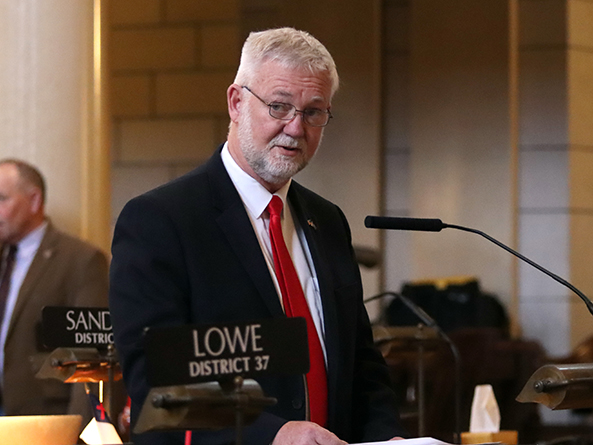Partisan elections for certain public power districts advanced
An attempt to move public power and irrigation district elections to a partisan format was narrowed and advanced from general file Jan. 26.

As originally introduced last session by Kearney Sen. John Lowe, LB541 would have required that all such elections be conducted on partisan ballots for both the primary and general elections.
A Government, Military and Veterans Affairs Committee amendment, adopted 31-9, would narrow the bill’s provisions to cover only districts receiving annual revenue in excess of $500 million. The change effectively would limit the measure to the Nebraska Public Power District and the Omaha Public Power District.
Lowe said he brought the proposal after learning of “outside interests” who were “pouring” thousands of dollars into NPPD elections in 2022 — funds he characterized as “East Coast money” meant to influence district members toward a specific political agenda. One NPPD candidate in his district received nearly $100,000 from one source, he said.
Lowe acknowledged that none of those organizations engaged in wrongdoing or broke any laws, but he said making elections partisan would give voters a better idea of where candidates stand. Nebraskans have difficulty learning about “down-ballot” races, he said, and identifying candidates as Republicans, Democrats or Independents would simplify the process.
“Most of the time, that one word choice will tell voters 99% of what they need to know about how a candidate will govern,” Lowe said.
Sen. Barry DeKay of Niobrara supported the bill and the amendment. A former member of the Nebraska Public Power District board, DeKay said groups from outside Nebraska are trying to influence power districts to move toward wind and solar power generation.
“These groups have never approached me [or] asked me what my views were on generation — they opposed me because of my party affiliation,” DeKay said.
Sen. Jane Raybould of Lincoln opposed the bill and offered a motion to recommit it to committee, saying public power is not a partisan issue.
Monied interests have sought for years to influence Nebraska elections, Raybould said, usually in favor of oil, coal and gas. Supporters of LB541 only seem concerned, however, if that money comes from entities favoring wind and other renewable energy sources, she said.
“The good news — for all Nebraskans — is that the boards that are elected remain grounded in their mission of delivering reliable and affordable public power throughout the state,” Raybould said.
Bellevue Sen. Carol Blood also opposed the bill. Candidates should be encouraged to think for themselves, she said, rather than being defined solely by their party affiliation. That philosophy has worked well in the Nebraska Legislature in the past, she said, and in other nonpartisan elected bodies.
In nonpartisan systems, Blood said, people are free to seek collaboration and compromise and are encouraged to work together and find common ground rather than focusing on their own political agenda.
“Partisanship is not better for democracy,” she said. “Nonpartisanship is.”
Also speaking in opposition was Lincoln Sen. George Dungan, who said nonpartisan elections encourage voters to do their research rather than simply voting for one party or the other.
“I think we should be encouraging more civic engagement,” Dungan said.
Raybould’s recommit motion was defeated 15-28, and LB541 advanced to select file on a 29-16 vote.


